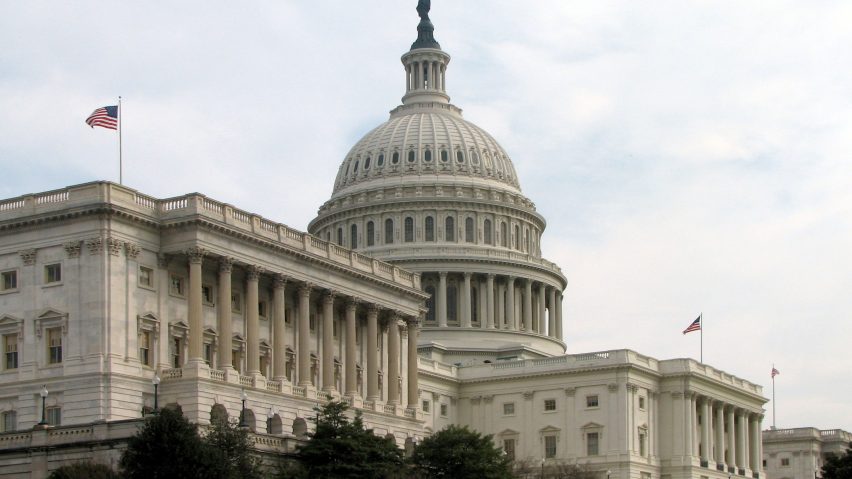
AIA opposes President Trump's draft rules for Making Federal Buildings Beautiful Again
The American Institute of Architects has called on members to sign an open letter to the Trump Administration after a plan to introduce an order that all federal buildings should be built in the "classical architectural style" was discovered.
The AIA released the statement and online petition for the White House yesterday, shortly after the Architectural Record revealed it had obtained a draft of the order, called Making Federal Buildings Beautiful Again.
If approved, it would update the 1962 Guiding Principles for Federal Architecture to make classical architecture the required style for any US federal courthouse.
The AIA said that it "strongly and unequivocally" opposed the change, which would also affect federal public buildings costing over $50 million (£38 million).
"A top-down directive on architectural style"
"The AIA strongly condemns the move to enforce a top-down directive on architectural style," the organisation wrote in the open letter.
"Design decisions should be left to the designer and the community, not bureaucrats in Washington, DC," it added. "All architectural styles have value and all communities have the right to weigh in on the government buildings meant to serve them."
According to the AIA, "classical architecture" as defined by the White House is derived from classical Greek and Roman architecture. There are some "allowances for 'traditional architectural style'", which include Gothic, Romanesque, and Spanish colonial.
Any references to Brutalism, the controversial style that only dates back to the 1950s, would be banned entirely.
"High bar" of new order would limit exceptions
While the guidelines for Making Federal Buildings Beautiful Again allow for the inclusion of some other architectural styles, the AIA said that the rules are so stringent they would limit creativity.
"The high bar required to satisfy the process described within the executive order would all but restrict the ability to design the federal buildings under this order in anything but the preferred style," the added AIA.
The existing Guiding Principles for Federal Architecture were written for President Kennedy by New York senator Daniel Patrick Moynihan, who architecture critic Paul Goldberger described as "the most architecturally sophisticated Federal official since Thomas Jefferson".
The new order – which is named after Trump's campaign slogan Make America Great Again – comes in contrast to Moynihan's guidelines, which call for the "finest contemporary American architectural thought".
"Design must flow from the architectural profession to the Government"
"The development of an official style must be avoided," the guidelines read. "Design must flow from the architectural profession to the Government and not vice versa."
The order is among a number of political issues that the AIA and the Trump Administration have locked heads over, including the climate treaty withdrawal and his immigration policies.
In particular, the two have been at loggerheads over climate change after the president revealed his intention to withdraw from the Paris Agreement in 2017. The following year, AIA called on its members to sign an open letter to Trump as a means of voicing its opposition to his climate change policies.
Late last year, it called for Trump to reverse his "shortsighted decision" to withdraw the US from the Paris Agreement amid the global climate crisis.
Read the full statement from the AIA below:
The AIA learned several months ago that there is a draft executive order being circulated by the Trump Administration for consideration by agency officials that would officially designate "classical" architecture as the preferred style of all U.S. federal courthouses.
We have voiced our fervent opposition directly to the White House and officials in the relevant agencies. Additionally, all federal public buildings in the Capital region would be required to adhere to the same "classical" style (and all other federal public buildings whose costs exceed $50 million in modern dollars). The AIA strongly and unequivocally opposes this change in policy to promote any one style of architecture over another for federal buildings across the country.
The draft executive order defines "classical architectural style" to mean architectural features derived from classical Greek and Roman architecture. There are some allowances for "traditional architectural style" which is defined to mean classical architecture along with Gothic, Romanesque, and Spanish colonial. The draft executive order specifically prohibits the use of Brutalist architecture, or its derivatives, in any circumstance.
Except for Brutalism, there is some language in the draft executive order that would allow for other architectural styles to be used. However, the high bar required to satisfy the process described within the executive order would all but restrict the ability to design the federal buildings under this order in anything but the preferred style.
The AIA strongly condemns the move to enforce a top-down directive on architectural style. Design decisions should be left to the designer and the community, not bureaucrats in Washington, DC. All architectural styles have value and all communities have the right to weigh in on the government buildings meant to serve them.